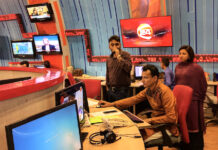
Journalism involves many tasks that requires a wide variety of skills. We look at some of the jobs journalists do.
Journalists are the chroniclers of our time, acting as vital conduits of information in an ever-evolving media landscape. They go beyond simply reporting facts; they contextualize, analyse, and hold power accountable. Here’s a more comprehensive look at their diverse roles:
Core Functions and Processes:
- Newsgathering and verification:
- This extends beyond simple note-taking. It involves rigorous research, source vetting, cross-referencing, and the use of investigative techniques.
- Journalists employ diverse methods: interviews, document analysis, data mining, observation, and participation in events.
- Verification is paramount, especially in the age of misinformation. Journalists must adhere to strict ethical guidelines to ensure accuracy and fairness.
- Storytelling and presentation:
- Journalists are skilled storytellers, adapting their narratives to various platforms (print, broadcast, digital, social).
- They use diverse formats: news reports, features, investigative pieces, documentaries, podcasts, and multimedia presentations.
- They must consider their audience, tailoring their language and style for clarity and engagement.
- Multimedia production:
- Beyond basic photography and video, journalists now use sophisticated tools for data visualisation, interactive graphics, and immersive storytelling (e.g., virtual reality).
- They often possess skills in audio and video editing, graphic design, and web development.
- Audience engagement and community building:
- Modern journalism emphasises interaction with the audience. Journalists engage in social media, host online forums, and participate in community events.
- They seek feedback, address concerns, and foster a sense of dialogue.
Journalistic roles and specialisms:
- Reporters:
- General assignment reporters cover a wide range of stories, while beat reporters develop expertise in specific areas.
- Investigative reporters conduct in-depth investigations, often uncovering wrongdoing or corruption.
- Correspondents:
- Foreign correspondents report from overseas locations, providing firsthand accounts of international events.
- Domestic correspondents cover national or regional news from locations outside of the main news organisations home location.
- Editors:
- News editors manage the daily news cycle, assigning stories, and ensuring accuracy and timeliness.
- Managing editors oversee the overall news operation.
- Copy editors focus on grammar, style, and factual accuracy.
- Sub-editors check the work submitted by reporters to ensure it is grammatically, factually and stylistically correct.
- Forward planning editor:
- They are responsible for planning the production of original, in-depth journalism. They plan beyond the next day to the following week, month, and year.
- Online editors:
- They are responsible for the online presence of the news organisation, including website content, social media, and multimedia.
- They analyse web traffic and engage with online audiences.
- Producers:
- Broadcast producers manage the production of news and current affairs programmes, coordinating talent, scheduling, and technical aspects.
- Assistant producers:
- They are junior to producers and help with research, contacting guests, organising logistics, and making sure the reporters and correspondents have what they need to cover stories.
- Podcast producers:
- They are responsible for all aspects of podcast creation.
- Columnists and commentators:
- They offer analysis, opinion, and commentary on current events.
- Critics:
- They provide reviews and evaluations of art, culture, and entertainment.
- Guest bookers:
- They are responsible for arranging for guest to appear on news bulletins and in news and current affairs programmes. They are usually seasoned journalist with wide experience and good contacts.
- Data journalists:
- They use data analysis and visualisation to uncover trends, identify patterns, and tell stories.
- Photojournalists and videographers:
- They capture visual narratives that complement or stand alone as news stories.
- Fact-checkers:
- They verify claims made by public figures and organizations, combating misinformation.
- Social media editors:
- They manage and curate the news organisations social media presence.
- Audience engagement editors:
- They focus on building and maintaining relationships with the audience.
- Newsletter editors:
- They produce and manage email newsletters.
Ethical considerations and societal impact:
- The Fourth Estate:
- Journalists play a crucial role in holding power accountable, acting as a check on government and other institutions.
- They strive to provide balanced and impartial reporting, even in the face of pressure or criticism.
- Giving voice to the voiceless:
- Journalists have a responsibility to amplify marginalized voices and shed light on social injustices.
- Combating misinformation:
- In the digital age, journalists are on the front lines of combating misinformation and disinformation.
- Maintaining public trust:
- Journalists must adhere to high ethical standards to maintain public trust and credibility.
- Adapting to the digital age:
- Journalists must continually adapt to new technologies and platforms, while maintaining their core values.
Motivations and challenges:
- Journalists are driven by a passion for truth, a desire to inform, and a commitment to public service.
- They face challenges such as time constraints, resource limitations, and threats to their safety.
- The rise of citizen journalism, and AI-generated content also adds challenges to the journalistic profession.
These are just some of the many journalistic roles that exist in the news environment. Anyone starting off in a career in journalism should look at all the option before deciding which is the best fit for their character, experience and knowledge.








